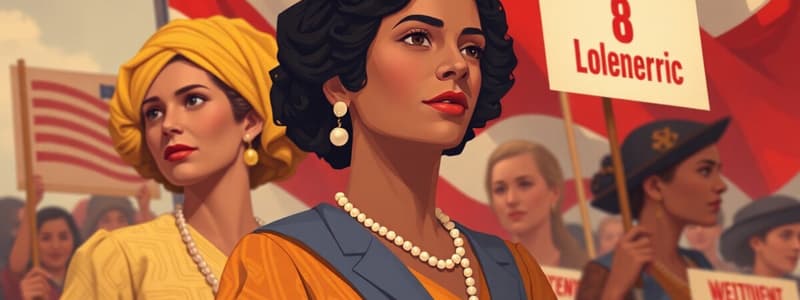Podcast
Questions and Answers
What was the primary economic activity that contributed to the Otero family's wealth during Nina Otero-Warren's early life?
What was the primary economic activity that contributed to the Otero family's wealth during Nina Otero-Warren's early life?
- Cultivating vineyards and producing wine for export to European markets.
- Managing silver mines and extracting valuable ore for industrial use in the eastern United States.
- Raising sheep on vast acres of land and selling them at a high price during the California gold rush. (correct)
- Operating a successful trading post that facilitated commerce between settlers and indigenous populations.
Considering Adelina Otero-Warren's upbringing in a well-to-do Hispano family, which factor most significantly shaped her early exposure to cultural traditions and societal expectations?
Considering Adelina Otero-Warren's upbringing in a well-to-do Hispano family, which factor most significantly shaped her early exposure to cultural traditions and societal expectations?
- Participation in cattle drives across the open range fostering egalitarian values.
- Immersion in indigenous rituals and practices.
- Adherence to Catholic education and social events in Santa Fe. (correct)
- Exposure to diverse perspectives of immigrant communities.
What was the primary strategy employed by Southern senators in Congress during the initial February 1919 debate over the amendment concerning women's suffrage?
What was the primary strategy employed by Southern senators in Congress during the initial February 1919 debate over the amendment concerning women's suffrage?
- Advocating for the principle of states' rights to decide voter eligibility, aiming to exclude specific groups. (correct)
- Introducing alternative amendments that focused on economic reforms rather than suffrage.
- Attempting to delay the vote indefinitely through procedural maneuvers and filibusters.
- Publicly supporting the amendment while privately lobbying against it to create division among suffragists.
What specific parliamentary tactic did anti-suffragists use immediately after Harry T. Burn's unexpected vote in favor of ratification, and what was their intention behind this maneuver?
What specific parliamentary tactic did anti-suffragists use immediately after Harry T. Burn's unexpected vote in favor of ratification, and what was their intention behind this maneuver?
How did the Otero family's social standing and political power most directly influence Adelina 'Nina' Otero-Warren's early life and opportunities?
How did the Otero family's social standing and political power most directly influence Adelina 'Nina' Otero-Warren's early life and opportunities?
Beyond women, which other groups faced significant barriers to voting rights in the United States even after the passage of the 19th Amendment, and what specific legislative act eventually addressed the voting rights of Native Americans?
Beyond women, which other groups faced significant barriers to voting rights in the United States even after the passage of the 19th Amendment, and what specific legislative act eventually addressed the voting rights of Native Americans?
What impact did the blending of families, due to her mother's remarriage after Nina's father died, likely have on Nina's development?
What impact did the blending of families, due to her mother's remarriage after Nina's father died, likely have on Nina's development?
Considering Nina Otero-Warren's character as a bold and educated young woman, which statement best reflects the potential conflict between her personal inclinations and societal expectations during her time?
Considering Nina Otero-Warren's character as a bold and educated young woman, which statement best reflects the potential conflict between her personal inclinations and societal expectations during her time?
What was the final legal action taken by anti-suffragists in 'Tunisians' following Tennessee's ratification of the 19th Amendment, and what ultimately resolved this challenge?
What was the final legal action taken by anti-suffragists in 'Tunisians' following Tennessee's ratification of the 19th Amendment, and what ultimately resolved this challenge?
What evidence from the text demonstrates that the fight for voting rights in the United States continues even after the passage of landmark legislation such as the Voting Rights Act of 1965?
What evidence from the text demonstrates that the fight for voting rights in the United States continues even after the passage of landmark legislation such as the Voting Rights Act of 1965?
Flashcards
Who was Nina Otero-Warren?
Who was Nina Otero-Warren?
Adelina Otero-Warren, nicknamed Nina, was a prominent figure from a wealthy Hispano family in New Mexico.
Otero Family Land
Otero Family Land
Nina's family held significant land south of Albuquerque, where they raised sheep and grew crops.
Manuel Otero's Background
Manuel Otero's Background
Manuel Otero, Nina's father, came from a noble Spanish family.
Eloisa Luna's Ancestry
Eloisa Luna's Ancestry
Signup and view all the flashcards
Otero Family & Gold Rush
Otero Family & Gold Rush
Signup and view all the flashcards
Indian Citizenship Act of 1924
Indian Citizenship Act of 1924
Signup and view all the flashcards
Twenty-Third Amendment
Twenty-Third Amendment
Signup and view all the flashcards
Voting Rights Act of 1965
Voting Rights Act of 1965
Signup and view all the flashcards
Twenty-Sixth Amendment
Twenty-Sixth Amendment
Signup and view all the flashcards
Margaret Mead
Margaret Mead
Signup and view all the flashcards




